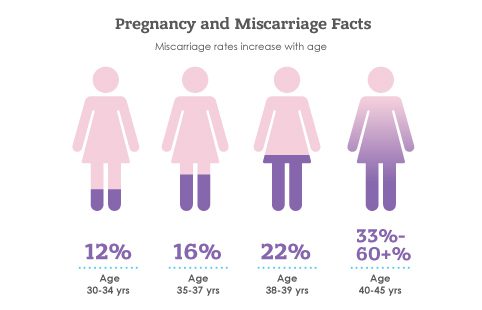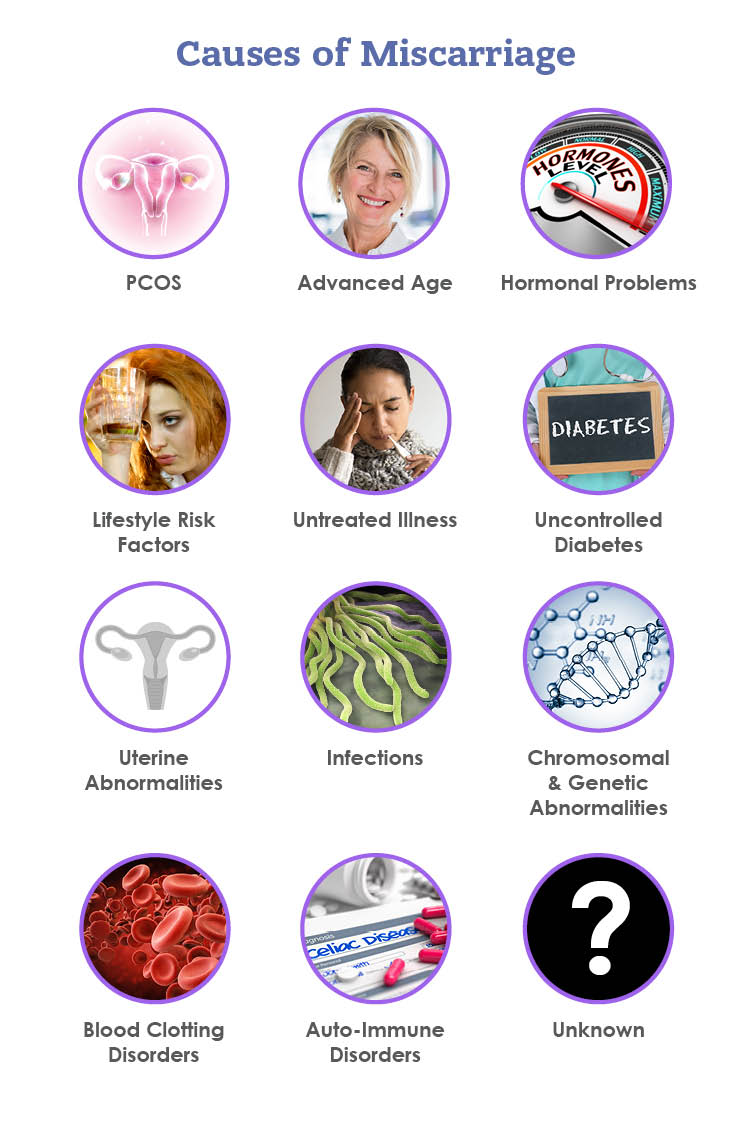Home »
Recurrent Pregnancy Loss
If you have experienced two or more miscarriages, you may need the help of a Reproductive Endocrinologist to:
- Identify causes of miscarriage
- Recommend treatment to increase the chances of sustaining pregnancy and delivering a healthy baby
Recurrent pregnancy loss, or recurrent miscarriage, is defined by the American Society for Reproductive Medicine (ASRM) as two or more pregnancy losses (miscarriages). A pregnancy loss is a pregnancy which involuntarily ended prior to 20 weeks. The pregnancy may have been confirmed by a pregnancy test, been visually identified on an ultrasound, or pregnancy tissue was identified after the pregnancy was lost.

Why did I miscarry my pregnancy?
Most pregnancy losses are related to chromosomal or genetic abnormalities that are random events. Chromosomal abnormalities may be caused by problems with the sperm, the egg, or with the early division of the cells during the development of the embryo. Around 12-15% of confirmed pregnancies end in miscarriage; that percentage typically increases as women get older. It’s estimated that 30-60% of all conceptions end in miscarriage before a woman even realizes she is pregnant. Unfortunately, the more pregnancy losses a woman experiences, the higher her risk of miscarrying the next pregnancy. However, overall, this risk remains under 50% per identified conception.
The age of the mother correlates with the the risk of miscarriage. Advanced Maternal Age (AMA), defined as a pregnancy in women 35 years or older, is thought to increase pregnancy loss due to the reduced quality of the eggs. The older a mother is, the higher her risk for having a child with genetic and chromosomal abnormalities, or experiencing a pregnancy loss due to chromosomal abnormalities in the embryo which are not compatible with life.
In some cases, recurrent miscarriage may be caused by abnormal uterus shape or the presence of uterine polyps or fibroids. These can distort the uterine cavity, leading to miscarriage. In other cases, there is poor blood supply or inflammation in the uterus that also interferes with the pregnancy. Auto-immune disorders, hormone abnormalities including PCOS (Polycystic Ovarian Syndrome), thyroid disease, diabetes, and other blood clotting disorders can increase the risk of pregnancy loss as well as blood clotting problems.
A common misperception is that stress, environmental factors, and occupations routinely affect pregnancy loss.

Hope for Couples Experiencing Repeated Pregnancy Losses
For couples who are trying to conceive a baby, a positive result on a home pregnancy test (HPT) represents a joyful new chapter in their family-building journey. Sadly, when a miscarriage occurs, the couple typically experiences shock, disbelief, and grief. However, pregnancy loss is far more common than most couples realize, with the chances increasing with a women’s age.
Fortunately, many women who experience pregnancy loss can have a successful outcome with their next conception. However, for approximately 3% of couples, pregnancy loss becomes a recurring problem. For these couples, the positive result of the HPT unleashes a roller coaster of emotions, including fear and anxiety.
Recurrent pregnancy loss (RPL) can affect both childless couples as well as those who have one or more healthy children. According to the American Society for Reproductive Medicine, couples who experience two or more pregnancy losses should undergo a medical evaluation from a reproductive endocrinologist. Testing can be helpful in elucidating a cause for RPL in up to 50% of couples and potentially lead to a treatment plan that eventually results in a successful pregnancy.
As mentioned earlier, the majority of miscarriages are due to chromosomal abnormalities in the embryo. Generally, embryos with too many or too few chromosomes (also referred to as aneuploidy) can not develop into a healthy baby and result in abnormalities that lead to fetal death. Most of the time, aneuploidy is a chance event, although the chances increase with age.
In addition to aneuploidy, other disorders associated with RPL include:
- Blood clotting disorders
- Antibodies that negatively affect embryo implantation or development of the placenta
- Abnormalities in the structure or shape of the uterus, including the presence of scar tissue, polyps, fibroids, or other congenital defects
- Hormonal conditions, such as poorly controlled diabetes or thyroid disease
- Lifestyle and environmental factors, such as obesity, cigarette smoking, use of drugs, consumption of alcohol, and caffeine
The positive news is that treatments are available to assist couples who are experiencing RPL. For women who have experienced two pregnancy losses, seeking an evaluation can bring them closer to reaching their dream of having a healthy baby.
What can a fertility specialist do for pregnancy loss?
Fertility specialists, also known as reproductive endocrinologists, are experts in helping people conceive. They also specialize in diagnosing and treating problems related to sustaining pregnancies. Many of the same issues that cause female infertility also affect the ability to carry a child to term.
When you visit with one of the board-certified fertility specialists at The Reproductive Medicine Group, they will take a detailed medical and family history, along with performing any necessary exams. Testing will be ordered, including genetic screening of both partners. These tests look for genetic and chromosomal abnormalities that may be causing RPL.
The uterus will also be evaluated. This can be done in several ways, but the most common ways are a saline sonogram (SIS) or a hysterosalpingogram (HSG). These exams allow your doctor to check the shape of the uterus, as well as the presence of fibroids, polyps, or scarring. An HSG is an X-ray exam that checks the function as well as the shape of both the uterus and the fallopian tubes, checking for blockage of the tubes. A saline sonogram can check the inside of the uterus, looking for abnormal shapes or growths.
Another method for evaluating the uterus is hysteroscopy, which allows the fertility specialist to directly visualize the inside of the uterine cavity. A hysteroscopy is a minor surgical procedure where a tiny camera is inserted into the uterus through the cervix so that the doctor can clearly see the inside of a woman’s uterus. At this time, the infertility doctor (who is a surgeon) can safely identify and/or remove:
- Polyps
- Fibroids
- Congenital abnormalities of the uterus
- Scar tissue
Bloodwork is ordered that checks for certain antibodies, like ones associated with blood clotting or auto-immune disorders. These antibodies may be associated with pregnancy loss or increased miscarriage rates.
Finally, and importantly, hormone function tests will be performed. These include thyroid, prolactin (another hormone that helps a woman make breast milk), and ovarian reserve tests. Ovarian reserve tests show how well the ovaries are functioning. Sometimes, when ovarian function is low, there are a higher number of eggs with genetic and chromosomal abnormalities.
Can recurrent pregnancy loss be treated?
Yes, many women dealing with RPL are able to get pregnant with the proper treatments. Treatments are dependent upon the underlying cause of the miscarriages. These infertility treatments include:
- Surgery to correct uterine abnormalities
- In vitro fertilization (sometimes with preimplantation genetic testing to screen for chromosomal abnormalities and birth defects in the embryo)
- Medication to correct hormone imbalances, improve the uterine lining, or reduce blood clot formation
Some couples can experience both problems getting pregnant as well as recurrent miscarriage. That’s why it’s important to seek testing and diagnosis from a Reproductive Endocrinology Specialist, who is an expert in conception and sustaining a pregnancy.
Advanced Fertility Care for Recurrent Pregnancy Loss in Florida
The Reproductive Medicine Group has many years of experience diagnosing and treating RPL and its related fertility concerns in Florida. With locations in North Tampa, South Tampa, Brandon, Clearwater, and Wesley Chapel, our expert team of fertility specialists is ready to answer all your questions and provide personalized fertility care. Schedule a consultation with The Reproductive Medicine Group.
